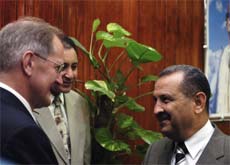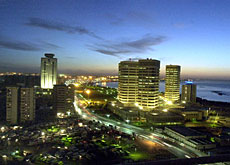Swiss hope to profit from Libyan trade

Economics Minister Joseph Deiss has wrapped up a three-day trip to Libya with intentions to increase trade with the North African country.
Switzerland and Libya are due to sign a double taxation accord in 2006. A lowering of Libyan customs duties is also on the cards, say officials.
Deiss, the first Swiss cabinet minister to visit the country, was holding talks with the Libyan government in a bid to boost bilateral relations and promote business ties with Switzerland.
Libya is Switzerland’s second-largest trading partner on the African continent after South Africa.
At the end of his visit, Deiss said that Libya – which has been undergoing economic reforms – had “a lot of potential”. He noted that Switzerland enjoyed a good reputation within the country.
Deiss said he was satisfied with his meetings with government ministers. He did not, however, meet the country’s head of state, Moammar Gaddafi. “This was not at the centre of the visit,” said Deiss.
Doing business
High on the agenda was how to do business together. Libyan Finance Minister Muhammad Ali al-Huwayz told Deiss that Libya needed foreign investment and knowledge.
But the slow pace of economics reforms as well as visa and other administrative problems have hindered many Swiss firms from trading with Libya in the past, it has been reported.
The double taxation accord between Switzerland and Libya, which could be signed by next year, is aimed at easing the situation. An investment-protection agreement between the two countries already came into force in May last year.
The subject of customs duties was also raised. “Libya is planning to reduce the high customs duties to a minimum,” said Jörg Reding, a senior official at the State Secretariat for Economic Affairs (Seco), who accompanied Deiss on the trip.
Swiss officials said Libyan Prime Minister Shukri Ghanim spoke of custom reforms during talks. Ghanim is reported to have called high customs duties “a source of corruption and bureaucracy”.
Reforms
Reding said that if accepted, the reforms would help Libya become a free-trade area, which would reduce the price of products on the domestic market. However, around 80 products would still be highly taxed.
Libya remains an important trading partner for Switzerland. While exports reached SFr189.5 million ($150.5 million) in 2004, imports from Libya were higher, at SFr790 million.
Petroleum makes up nearly 100 per cent of Libyan exports to Switzerland.
Libya’s economy has also grown considerably over the past few years. Switzerland has also welcomed moves to reform and liberalise the Libyan market after United Nations sanctions were lifted against the country in 2003.
swissinfo with agencies
Libya is Switzerland’s second largest trading partner in Africa and provides more than 40% of Swiss crude oil imports.
In 2004 imports from Libya, consisting almost exclusively of petroleum, increased by 4.5% to SFr790 million.
Exports, mainly in the machinery and pharmaceutical industries, soared by 55% to SFr189.5 million in the same year.

In compliance with the JTI standards
More: SWI swissinfo.ch certified by the Journalism Trust Initiative

You can find an overview of ongoing debates with our journalists here. Please join us!
If you want to start a conversation about a topic raised in this article or want to report factual errors, email us at english@swissinfo.ch.